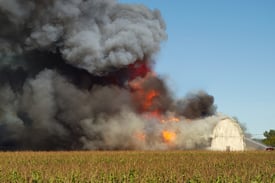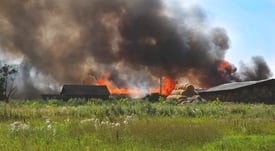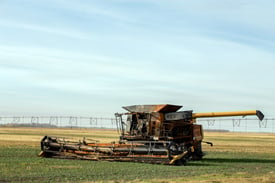
The agriculture industry encompasses many different jobs and tasks. From cultivating fields and livestock rearing, to processing crops and storing hay or fertilizers, there are many things to consider when it comes to fire safety.
From 2006 - 2010, there were an estimated 830 barn fires every year across the United States, according to the National Fire Protection Association (NFPA). These fires resulted in an average of one death, ten injuries and $28 million in property damage annually.
Fortunately, by educating yourself on the risks and changing your practices accordingly, you can take steps to protect your people and property, and prevent these fires from happening in the first place.
Flammable Materials

You may not think about it this way, but hay and straw are highly flammable materials. They can very easily catch fire – and then go on to spread the fire to the actual barn in which they are housed.
Other flammable materials include sawdust, cobwebs, grain dust, horse blankets, paint, fertilizer and pesticides and herbicides. If at all possible, these materials – including hay, straw and bedding – should be stored in a different building than where livestock is housed. This will help protect your animals from fire risks.
Additionally, hay can spontaneously combust. Because of this, it’s essential that you monitor the temperature of any stored hay. If the center has a reading of 150 degrees, you should disassemble any hay bales to promote air circulation. If the reading is 175 degrees or hotter, call your local fire department – they can assist with safely removing the hot hay from storage. You’ll also need to monitor baled hay’s moisture level, as the wrong level is a huge fire risk.
Also keep in mind any accelerants that you may have on a farm. These include gasoline, kerosene, oil, aerosol cans, paint thinner and other materials. These items must be stored in approved containers and labeled appropriately. These should be stored in a safe place, such as a farm office, and in some states, their location needs to be filed with local authorities. Check your local ordinances to see if this applies to you.
Ignition of Fires
Of course, all fires start with a spark. In an agricultural setting, there are several ways this can easily happen. Fires often start as a result of:
-
Cigarettes and matches
-
Sparks from machinery or vehicles
-
Motors or heaters
-
Electrical appliances or fixtures
-
Batteries
-
Broken glass
-
Chemicals
According to the NFPA, heating equipment is the most common cause of barn fires, followed by electrical distribution and lighting equipment. Always make sure your electrical is working properly, and check often for any damage done by rodents, the weather or other causes.
Avoid using space heaters if at all possible. And, don’t smoke around the barn – this step alone can go a long way in protecting it from fires.
Other Prevention Measures
 Even away from a barn or storage shed, there are other measures you should take to prevent fires.
Even away from a barn or storage shed, there are other measures you should take to prevent fires.
Make sure all plant or yard waste is stored well away from buildings and disposed of properly; leaving piles around can be a fire risk.
When building new structures, make sure they are constructed with fire safety in mind. Use approved fire doors and include fire walls in areas that need it, and use fire retardant paint. Smoke detectors and sprinkler systems should also be installed as required.
Finally, make sure you have a working fire hose and fire extinguishers around your property as required and recommended. Check that you have the proper type of extinguishers as well, as different classes are intended for different types of fires.
Fire prevention is essential if you work on a farm or in agriculture. You don’t just have property to consider – you also have animals and, of course, your people to protect. Don’t risk it – call in professionals to make sure you’re as protected as possible.




